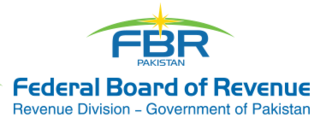
The Federal Ministry of Finance, abbreviated BMF, is the cabinet-level finance ministry of Germany, with its seat at the Detlev-Rohwedder-Haus in Berlin and a secondary office in Bonn. The current Federal Minister of Finance is Christian Lindner (FDP).

The Indian Revenue Service, often abbreviated as IRS, is an Indian government agency that is primarily responsible for collecting and administering direct and indirect taxes. As a central civil service under Group A of the executive branch of the Government of India, it functions under the Department of Revenue of the Ministry of Finance and is under the administrative direction of the Revenue Secretary and the ministerial command of the Minister of Finance.

The Federal Board of Revenue (FBR) (Urdu: وفاقی ہیئت برائے محصولات), formerly known as Central Board of Revenue (CBR), is a federal law enforcement agency of Pakistan that investigates tax crimes, suspicious accumulation of wealth, money-laundering make regulation of collection of tax. FBR operates through Inspectors-IR that keep tax evaders under surveillance, assess taxable incomes and perform special tasks for FBR Headquarters. FBR performs role of collection of taxation in the country from all individuals and businesses.

The National Tax Agency is the official tax collecting agency of Japan. As of October 2018, the Commissioner of NTA is Takeshi Fujii.

The Bureau of Internal Revenue(Filipino: Kawanihan ng Rentas Internas, or BIR) is a revenue service for the Philippine government, which is responsible for collecting more than half of the total revenues of the government. It is an agency of the Department of Finance and it is led by a Commissioner.

The federal administration of Switzerland is the ensemble of agencies that constitute, together with the Swiss Federal Council, the executive branch of the Swiss federal authorities. The administration is charged with executing federal law and preparing draft laws and policy for the Federal Council and the Federal Assembly.

The Singapore Customs is a government agency under the Ministry of Finance of the Government of Singapore. Singapore Customs was reconstituted on 1 April 2003, after the Customs and Excise Department and the Trade Facilitation Division and Statistics Audit Unit of International Enterprise Singapore were merged. The border function's at the land, air and sea checkpoints were also simultaneously transferred to Immigration and Checkpoints Authority (ICA). Singapore Customs became the lead agency on trade facilitation and revenue enforcement matters. It is also responsible for the implementation of customs and trade enforcement measures including those related to Free Trade Agreements and strategic goods.

The Royal Malaysian Customs Department is a government department body under the Malaysian Ministry of Finance. RMCD functions as the country's main indirect tax collector, facilitating trade and enforcing laws. The top management of JKDM is led by the Director General of Customs and assisted by 3 deputies, namely, the Deputy Director General of Customs Enforcement/Compliance Division, the Deputy Director General of Customs Customs/Inland Tax Division and the Deputy Chief Director of Customs Management Division. The Royal Malaysian Customs Department consists of several divisions, namely the Enforcement Division, the Inland Tax Division, the Compliance Division, the Customs Division, and the Technical Services Division.

The Tanzania Revenue Authority (TRA) is a semi-autonomous Government Agency of the United Republic of Tanzania. It was established by the Tanzania Revenue Authority Act, CAP. 339 in 1995 and started its operations on the 1st of July 1996. It is headed by the Commissioner General. The Current Commissioner General is Muhhamad M Mohhamed

The Ghana Revenue Authority (GRA) is the Ghana administration charged with the task of assessing, collecting and accounting for tax revenue in Ghana.

The Income Tax Department is a government agency undertaking direct tax collection of the government of India. It functions under the Department of Revenue of the Ministry of Finance. The Income Tax Department is headed by the apex body Central Board of Direct Taxes (CBDT). The main responsibility of the Income Tax Department is to enforce various direct tax laws, most important among these being the Income-tax Act, 1961, to collect revenue for the government of India. It also enforces other economic laws such as the Benami Transactions (Prohibition) Act, 1988, and the Black Money Act, 2015.

The Directorate General of Customs and Excise is an Indonesian government agency under Ministry of Finance that serves the community in the field of customs and excise. The Directorate General of Customs and Excise has the duty to organize the formulation and implementation of policies in the field of supervision, law enforcement, service and optimization of state revenue in the field of customs and excise in accordance with the provisions of legislation. The directorate also carry out some basic tasks of the Ministry of Finance in the field of customs and excise, in accordance with policies established by the Minister and securing government policies relating to the traffic of goods entering or leaving the Customs Area and the collection of import duties and excise and other state levies based on legislation apply.
The Tax Administration Reform Commission or TARC is committee appointed by the Government of India for giving recommendations for reviewing the public Tax Administration system of India. The Union Finance Minister had made an announcement in his Budget Speech 2013-14 for setting up of Tax Administration Reform Commission (TARC) to review the application of tax policies and tax laws in India in the context of global best practices, and to recommend measures for reforms required in tax administration. Accordingly, TARC was established vide the Government of India Notification dated 21 August 2013. The term of the Commission is 18 months and works as an advisory body to the Ministry of Finance. The Commission has given its first set of recommendations to the new government. Dr. Parthasarathi Shome is Adviser to the Indian Finance Minister, 2013. He was appointed Chairman of the Tax Administration Reforms Commission (TARC), Government of India

The Tax Administration Service is the revenue service of the Mexican federal government. The government agency is a deconcentrated bureau of the Secretariat of Finance and Public Credit, Mexico's cabinet-level finance ministry, and is under the immediate direction of the Chief of the Tax Administration Service. The SAT is responsible for collecting taxes, as well as applying fiscal and customs law, with the purpose of funding public spending in a proportional and equitable manner. Additionally, it is the bureau's responsibility to generate and collect information necessary for the formation and evaluation of fiscal policy.

The Ministry of Finance or Ministry of Treasury (MH) is the department of the Government of Spain responsible for planning and carrying out the government policy on public finance and budget. It applies and manages the regional and local financing systems and the provision of information on the economic-financial activity of the different Public Administrations.
Inland Revenue Department (IRD) Nepal is the department of Nepal Government under Ministry of Finance, located in Lazimpat, Kathmandu. The IRD is currently responsible for the enforcement of Tax Laws and administration of the following taxes: Income Tax, Value Added Tax, Excise Duty and duties like Entertainment fee.

The Spanish Tax Administration Agency, commonly known as Agencia Tributaria, is the revenue service of the Kingdom of Spain. The agency is responsible for the effective application of the national tax and customs systems and for those resources of other Public Administrations and the European Union whose management is entrusted to it by law or agreement.
The Rwanda Revenue Authority (RRA) is a government revenue collection agency established by the Parliament of Rwanda. The RRA is charged with enforcing, assessing, collecting, and accounting for the various taxes imposed in Rwanda.
Taxation is an important part in the Turkish economy. Turkey has a 25.5% tax to GDP ratio. Most of the taxes are levied by central government. However some specific taxes are levied by municipalities, with the amount determined by centrally issued legislation. Municipalities have no authority to make their own tax laws.
The Iranian National Tax Administration or in brief INTA is one of the organizations affiliated to the Ministry of Economic Affairs and Finance in Iran which is responsible for handling the country's tax affairs. Among the tasks of this organization are reforming and mechanizing the country's tax system and implementing Value-added tax.















